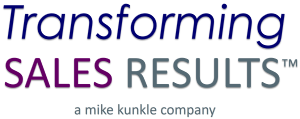Sales Enablers: For Best Results, Focus on Sales Force Performance (not Sales Reps)
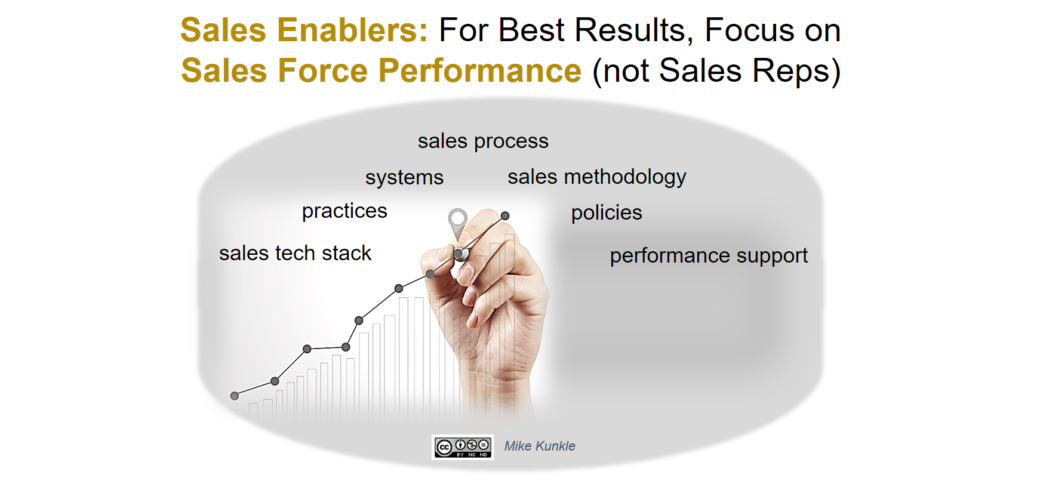
Have you reviewed sales enablement job descriptions lately? As members of the burgeoning Sales Enablement Society or the Sales Enablement Community of ATD (and almost anyone close to the Sales Enablement market) will tell you, “sales enablement” means different things to different people, and is being executed differently in different organizations. This certainly is apparent in the job descriptions I’ve reviewed.
There’s a trend in what I’m seeing, and in conversations I’m having, that concerns me. Not in all cases, of course, but in many, company leaders seem to believe that a sales enablement professional should be working directly with, and coaching, frontline sales reps, as a regular part of the enablement role.
A Balanced View
I disagree strongly with this, but I will offer a balanced disclaimer and acknowledge grey areas. I’ve written a lot about “sales nuances” and work very hard to avoid black and white thinking in general. There are circumstances where an approach like this might be needed in the short-term…
- In a start-up where the frontline sales manager (FLSM) must be a seller-manager (not something I usually support, but this is a real-world nuance we need to acknowledge in start-ups)
- When a rapidly-growing business is hiring and onboarding more sales reps than a FLSM could possibly support while also leading and managing his or her current team
- In other very small organizations, less complex companies, those with simple sales processes, or other situations where the other work of sales enablement does not take as much dedicated time and the enabler has the capacity to assist with field coaching without detracting from influencing organization-wide sales force performance (although even in this case, the enabler should work with or through the FLSM)
- On an as-needed, occasional basis when the FLSM needs help with a particular sales rep and the enablement leader has the specific or deeper expertise needed to help
- On an as-needed, occasional basis when a FLSM is being coached and supported on how to coach reps more effectively
With such exceptions noted, generally speaking, I think this is the completely wrong approach toward sales enablement.
Sales Enablement leaders should be enabling frontline sales managers to hire, train, coach, develop, lead, and manage sales reps more effectively – NOT coaching reps themselves.
Where, Oh Where Has My OD Gone? Aka B = f(P,E)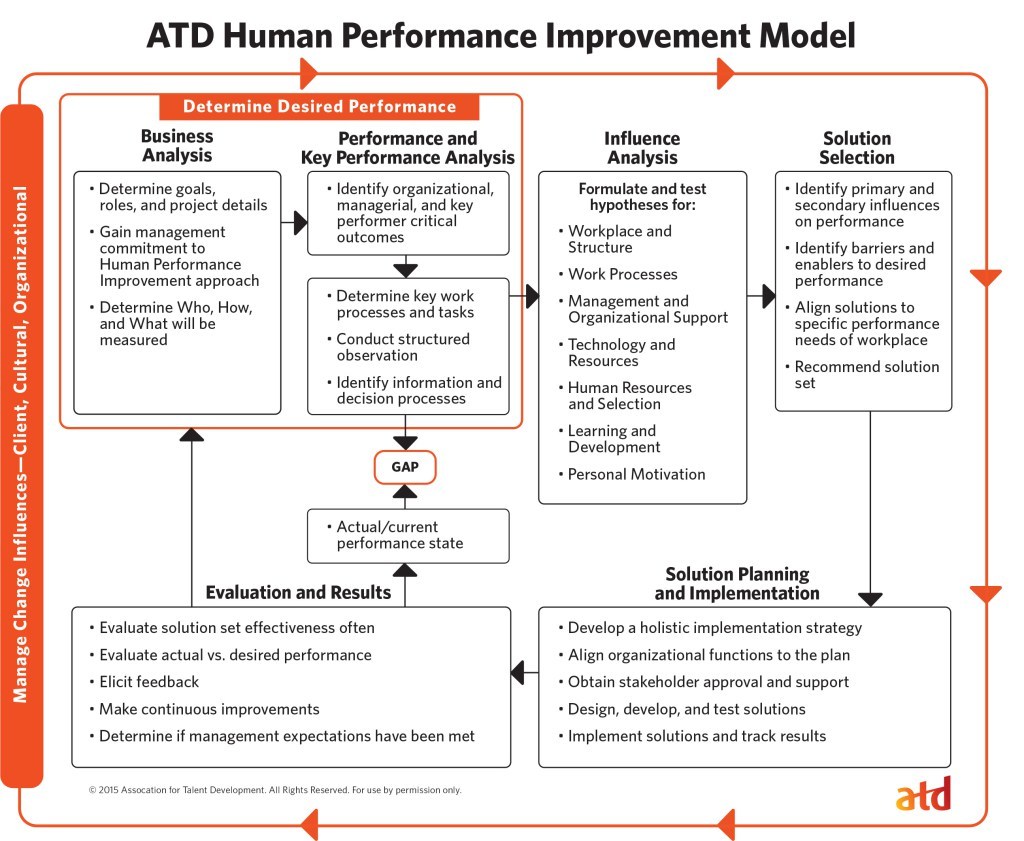
I think it’s a shame that more sales enablement leaders and perhaps more sales or business leaders in general, don’t have a better grounding in formal strategic planning, tactical execution planning, organization development (OD), organization effectiveness (OE), organizational behavior, and change management. If getting better business results is the purpose of leadership, these disciplines – along with aligning the organization around achieving key strategic initiatives – offer the best path to that outcome. (By the way, the equation B = f(P,E) means that behavior is a function of the person and the environment. Thank you once again, Kurt Lewin. See this and this for more.)
This is why I have focused for years on putting systems, processes, methodologies, practices, policies, technology, and other performance support in place to create the right environment for sustainable, ethical, high performance. Organization cultural work, employee engagement work, rewards and recognitions efforts, and creating a learning organization go a long way toward this end, as well. (Check out http://www.odnetwork.org/page/WhatIsOD for more on OD.)
The true work of Sales Enablement
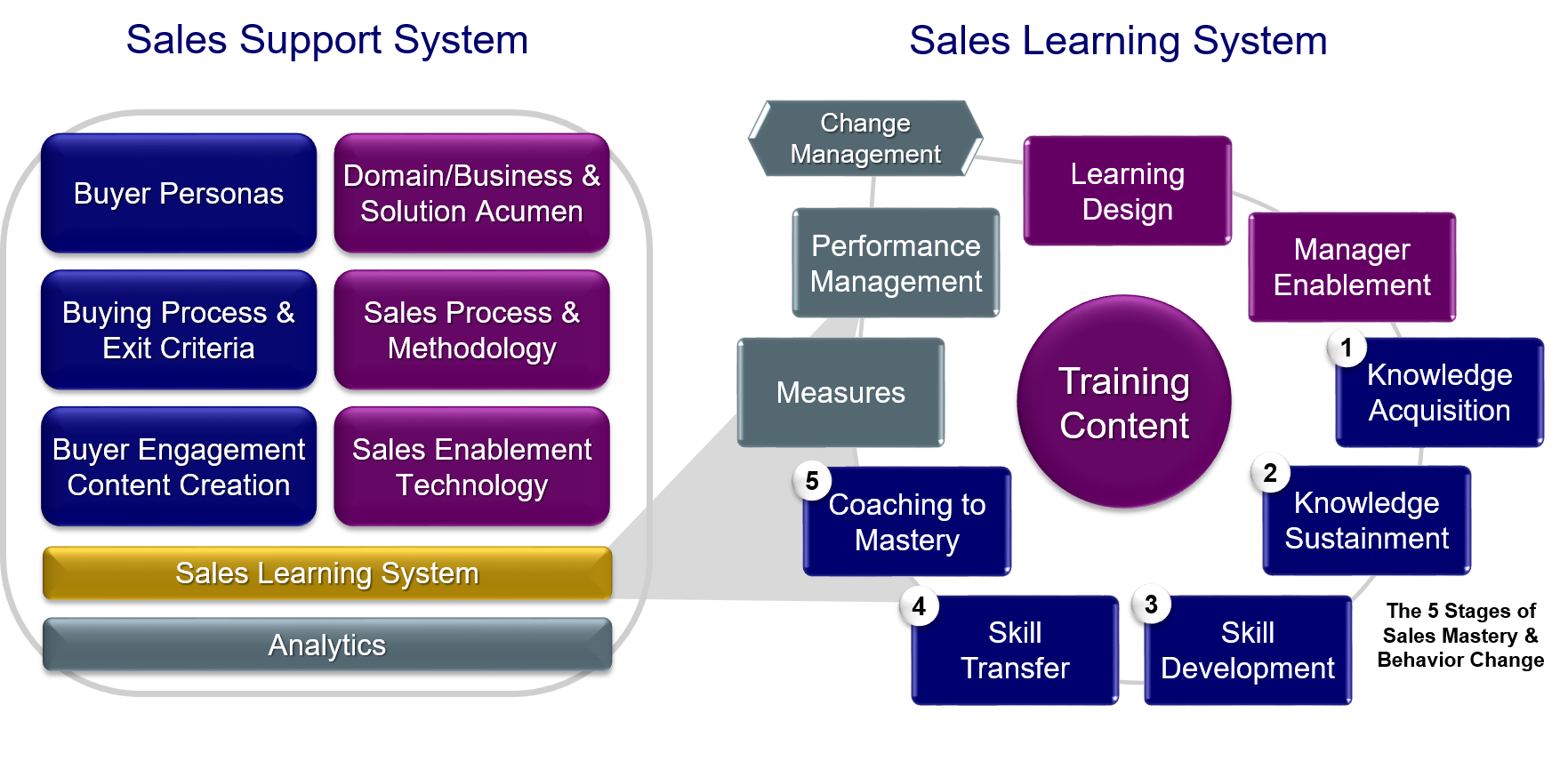
My recent work on Effective Selling Systems and Effective Learning Systems is an outgrowth of my time learning about OD and OE. Implemented and executed well, these systems get results. And I’m talking 2X to 10X results, not an incremental 5% YOY improvement.
Want to take this even further? Go beyond just Selling and Learning Systems to what I call the Fantastic Four, and include Selection, Selling Support, Learning, and sales Management Systems:

Talent management and, in our sales world, sales readiness and sales enablement, are big parts of this approach. If you create the right environment for performance and plug the right people into the equation – with proper hiring, training, coaching, development, management, and leadership – the results can be truly transformational.
No guts, no glory
We tend to aim low. I understand all the reasons and pressures that encourage this, but to me, the above (and aiming high to transform results) is the real work of Sales Enablement. This approach is what truly “enables” a sales force to perform at higher levels.
As always, the right “content” must be plugged into the equation. If you’ll allow me to depart from thinking of content as just training or marketing collateral, perhaps you can think of “content” as “inputs,” and it might include things like:
- Training content
- Market and buyer knowledge, as well as buyer’s journey documentation with exit criteria
- Sales methodology
- Sales messaging
- Sales support and marketing collateral
- Performance support / job aids / forms (e-forms and sales enablement software, hopefully integrated into reps’ and managers’ workflow)
- Management operating rhythm (cadence) and how managers should manage to get results
- And more
So, how does all this tie to my pet peeve on sales enablers coaching reps directly as a key responsibility of their job?
Back to the Point: Prioritization and Impact
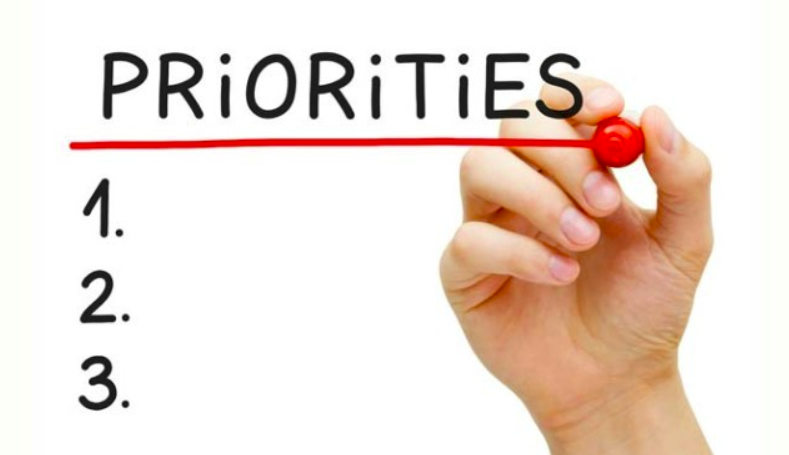
For every hour a sales enablement pro spends working with an individual sales rep, they are not influencing the performance of the entire sales force.
“The needs of the many outweigh the needs of the few.” ~ Mr. Spock
Okay, yeah, I quoted Mr. Spock. There it is. And while philosophers have debated this logic and its ethics in certain situations, it certainly applies here.
The return of time and energy in terms of sales performance improvement is far greater when a sales enabler spends time on organization-wide initiatives (enabling performance through systems, processes, methodologies, training/effective learning systems, effective selling systems, management operating rhythms, performance support, etc.) than when spending time directly improving the performance of individual sales reps. The more time spent with individual reps, the less time spent on initiatives that have a wider-reaching impact.
In addition, the work of spending time directly improving the performance of individual sales reps, should fall squarely on the shoulders of FLSMs, not sales enablers.
If these managers need enablement, development, or support – provide it! Sales manager enablement is critical and should be a major focus for sales enablers. Train, coach, and develop FLSMs, and provide performance support in every way sensible, in partnership with their managers, who should be involved and doing their own coaching with documented action plans and performance management steps (when appropriate), to hold the FLSMs accountable. And please, get out of the sales prevention business and remove obstacles to your FLSMs doing their real job.
But doing their coaching job for them, in a regular cadence, as an expectation of sales enablement? I can’t agree with this, and you shouldn’t either.
_________________________________________________
As usual, this is what I think. More importantly… What do YOU think?
I’d enjoy hearing your thoughts and experiences in the comments section. If you enjoy this post, please feel free to share it with others.
Thanks for reading, be safe out there, and by all means… let’s continue to elevate our sales profession and evolve, elevate and professionalize the Sales Enablement function.
Mike Kunkle

Let’s get connected:
- My Blog: http://www.transformingsalesresults.com (You are here.)
- My LinkedIn Publisher Posts: http://bit.ly/MikeKunklePublisher
- My Sales Transformation Straight Talk with Mike Kunkle Webinars: http://bit.ly/STSTonSMM
- The Sales Experts Channel Webinars: http://bit.ly/SalesExpertsChannel
- LinkedIn: http://www.linkedin.com/in/mikekunkle
- Twitter: https://twitter.com/mike_kunkle
- SlideShare: https://www.slideshare.net/MikeKunkle
